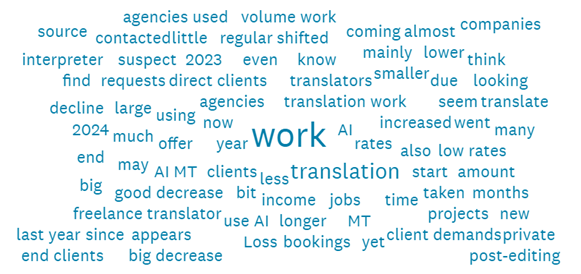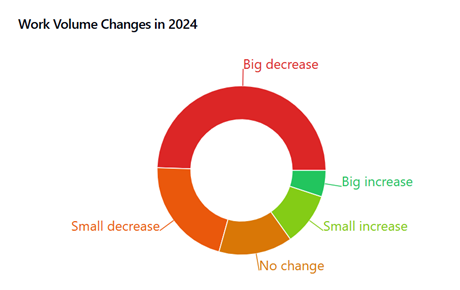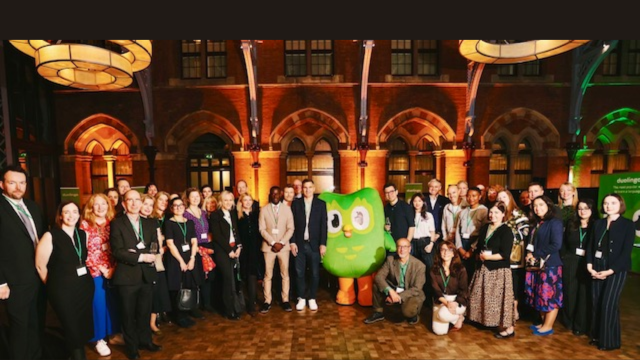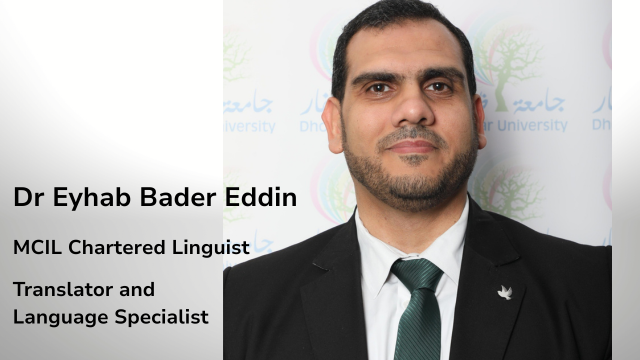-
QUALIFICATIONS
- For Linguists Worldwide
- For UK Public Services
- Preparation
- Policies & Regulation
-
MEMBERSHIP
- Join CIOL
- Professional Membership
- Affiliate Membership
- Chartered Linguist
- Already a member?
- Professional conduct
- Business & Corporate Partners
-
LANGUAGE ASSESSMENTS
- English
- All Other Languages
-
CPD & EVENTS
- Webinars & Events
- CIOL Conferences
- Networks
- CIOL Mentoring
-
NEWS & VOICES
- News & Voices
- CIOL eNews
- CIOL Awards
- The Linguist Magazine
- Jobs & Ads
-
RESOURCES
- For Translators & Interpreters
- For Universities & Students
- Standards & Norms
- CIOL & AI
- All Party Parliamentary Group
- In the UK
- UK Public Services
- Find-a-Linguist
Changes in work volumes: freelance translators/interpreters

By Dom Hebblethwaite, CIOL Head of Membership
In a recent eNews update we asked: "As a freelance translator and/or interpreter, how have your work volumes changed in 2024?"
The response to our survey was exceptional, with members providing detailed insights into their experiences. We are grateful to every CIOL member who took the time to share their perspective. While we cannot include every comment, the responses below paint a clear picture of some of the transformations occurring in our profession, particularly in translation services, and how CIOL members are adapting to these changes.
There has been much debate about the effects of Generative AI, added to advances in Neural Machine Translation (NMT), on the language 'industry'. CIOL's December freelance translator and interpreter member poll confirms the 'felt impact' of technological change on those of you who work in the language services sector in 2024. With over 70% of respondents reporting decreased work volumes, many language professionals are facing very real challenges.
The Scale of Change
The numbers tell their own story. Nearly half of our respondents (49%) reported a significant decrease in their work volumes during 2024, whilst an additional 21% experienced a smaller decline. Only 14% felt they had maintained stable work volumes, albeit a combined 11% saw small increases, and 5% reported substantial growth.

These statistics, coupled with our members' detailed feedback, point to real shifts in how language services are being delivered and valued. The impact extends beyond a simple reduction in volumes to pose some challenges to core aspects of how our profession has historically operated. CIOL members continue to demonstrate remarkable resilience and adaptability, with many successfully pivoting their business models and expanding their service offerings to meet evolving market demands.
Understanding the Changes
Machine Translation Post-Editing (MTPE) - the process of reviewing and correcting machine-translated text – has become increasingly prevalent over a number of years, creating opportunities but also many challenges for professional linguists. Our members report varying experiences with this shift:
"Uncertified translation work has almost completely dried up and is only partially offset by MT work."
Another member shares a similar experience:
"I'm working a bit more this year due to marketing myself more, but most of it is now MTPE, which is a bit frustrating."
Many members find much less value and much less to enjoy in work with MT or are dissatisfied by changing translation worksflows.
"Some of my translation agencies have closed and others only offer PEMT, which I refuse. Translation is rarely commissioned. The only translation I do are Birth Certificates which cannot be translated by AI and would not be accepted as such by the Embassy."
Another member says:
“I left the freelance industry in 2024. In my language pair and specialisation there is simply too much pressure from AI. The work has shifted to business / legal experts with good AI tools available (e.g. corporate AI solutions).”
And a third:
“Basically speaking, an existentially threatening drop in requests for translations. I specialize in legal translations but even in that sector, work is scarce. In return, a rise in requests for post-editing of AI translations. The quality is generally poor but occasionally workable although the result is always a huge compromise and the work very frustrating. If that's all that is left for a translator, I shall slowly wrap things up and move towards retirement.”
Quantifying this change, one member adds:
“The number of jobs has declined by between one sixth and one eighth compared to 2022-23 and they are now mostly MTPE or MT, and therefore of much lower value.”
However the effects are being felt more immediately in translation work than in interpreting:
“My translation work, above all, has decreased significantly in comparison with previous years. I believe that the main reason for this is AI. I am not noticing such a huge change in demand for interpreting work.”
Disruption of Traditional Models
Transformation of the language services sector is particularly evident in the changing dynamics between language service companies, freelance professionals, and end clients. Two clear trends emerge from our survey:
The traditional Agency Model is under pressure - many established language service companies are struggling to adapt to the new landscape:
"The flow of work I used to get from agencies has pretty much disappeared and I suspect this is because end clients are choosing to use AI and not even involve the agencies. Either that, or agencies are using translators who are prepared to use MTPE (which I am not prepared to do)."
“Several big clients (agencies) have gone into liquidation The effects of AI and MT - meaning that remaining client agencies only want MTPE instead of 'human translation' "
“Agency work has almost dried up - I used to work with 6 and now I work with 2. I was contacting the other 4 regularly to ask about work; they all blamed AI and one is winding up on 31 December.”
A noticeable shift to Direct Client relationships - In response, many CIOL members are successfully transitioning to working directly with end clients:
"There is a difference in the volume of work being received from agencies vs. private clients. The volume of work I've been receiving from agencies has decreased significantly since the Covid pandemic - by almost three quarters. Almost all of my work now comes from private clients."
Another member is even more direct:
"I am a translator now solely working for direct clients due to the low rates and tight deadlines offered by agencies."
This trend is encapsulated by another member's experience:
"I've had a big decrease in translation work from agencies, but this has been balanced out by some lower-volume, well-remunerated work from direct clients, which has meant that my income has stayed around the same this year overall."
This shift from Agency to Direct Client relationships brings both challenges and opportunities.
While it demands skills in client acquisition and relationship management, many members report that higher rates from direct clients help maintain income levels even with lower overall volume – and increased satisfaction in the work. And we will have more to say on how successful linguists are navigating the current tech hype cycle through strategic specialisation, professional certification, and innovative service offerings.
Dom Hebblethwaite is the Head of Membership for the Chartered Institute of Linguists. For more on Dom see his profile here.
Views expressed on CIOL Voices are those of the writer and may not represent those of the wider membership or CIOL.
Filter by category
More
The Chartered Institute of Linguists (CIOL), Incorporated by Royal Charter, Registered in England and Wales Number RC 000808 and the IoL Educational Trust (IoLET), trading as CIOL Qualifications, Company limited by Guarantee, Registered in England and Wales Number 04297497 and Registered Charity Number 1090263. CIOL is a not-for-profit organisation.








